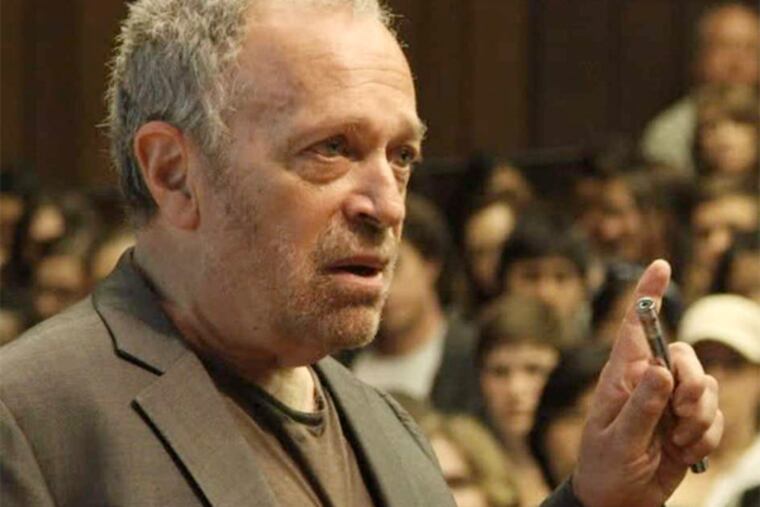'Inequality for All,' must-see documentary on widening income gap
If a movie crammed front-to-back with bad news, woeful stats, and glaring injustice can be considered inspiring, well, then, Inequality for All - starring the diminutive, indefatigable Robert Reich - is that movie.

If a movie crammed front-to-back with bad news, woeful stats, and glaring injustice can be considered inspiring, well, then, Inequality for All - starring the diminutive, indefatigable Robert Reich - is that movie.
A must-see documentary about America's widening income gap and shrinking middle class, Inequality for All shadows the former secretary of labor (in the first Clinton administration) and current University of California Berkeley economics professor as he drives his Mini-Cooper around, meeting with families struggling to live paycheck to paycheck, faced with mounting expenses, day care costs, rents, mortgages - household budgets in the red, no matter how hard they try.
Directed by Jacob Kornbluth and deploying nifty animated graphics (pie charts and bar graphs, oh my!), Inequality for All should be required viewing in high schools, colleges, and on Capitol Hill, where the trickle-downers keep denying that the system is broken.
I'm sorry, but this film makes an absolutely convincing case that the system is, indeed, busted. "Today, the richest 400 Americans have more wealth than the bottom 150 million of us put together," Reich says at one point, having contrasted the typical male worker's salary in 1978 with that of the average wage earner in the top 1 percent back then - and how that gap has exploded now.
"Think about it," he says. "Four hundred people have more wealth than half the population of the United States."
In the ranks of the top 1 percent is Nick Hanauer, a Seattle pillow manufacturer, venture capitalist, and early investor in Amazon, who puts the lie to the belief that the wealthy should be left alone in a free-market system because they are the "job creators" - their success means more commerce, more people with money in their pockets.
In fact, Hanauer argues, it is the middle class who are the real job creators - the consumers who keep the economy going. Even "a person like me," he says, can buy only so many pairs of jeans, so many pillows, so many houses. If the middle class continues to get smaller, the economic engine that powers the country sputters and stalls.
Reich teaches a "Wealth and Poverty" course at Berkeley. The large hall is packed, and his lectures are excerpted in the film. It's easy to see why the class is so popular: Reich is funny, poignant, passionate. And Kornbluth gets Reich to talk about his childhood, the challenges he faced growing up when his body refused to grow (the 4-foot-10 Reich suffers from a rare genetic disorder, Fairbanks syndrome). When he was a kid, Reich looked for friends to protect him from the bullies. One of his protectors was Michael Schwerner. In 1964, Schwerner, a civil rights activist who joined the "Freedom Summer" campaign, was killed by members of the Ku Klux Klan in Philadelphia, Miss. The loss of his friend changed Reich's life, inspiring him to fight bullies and protect the powerless.
Another fateful friendship, with Bill Clinton, began when the two students were among a troop of Rhodes scholars heading for Oxford in 1969. In those days, they crossed the Atlantic by boat, and Reich, suffering from seasickness, was curled up on his bed, when there was a knock at the door. The tall guy from Arkansas had heard Reich was sick, and brought him a bowl of chicken soup.
So, yes, in Inequality for All it's impossible not to come to like the self-deprecating economist and his stories of triumph, tragedy - and chicken soup. Chicken soup for a nation's soul?
srea@phillynews.com
215-854-5629
@Steven_Rea